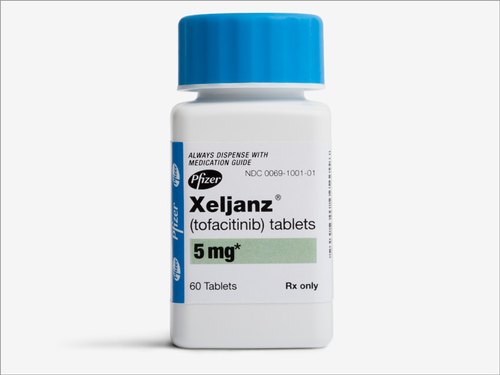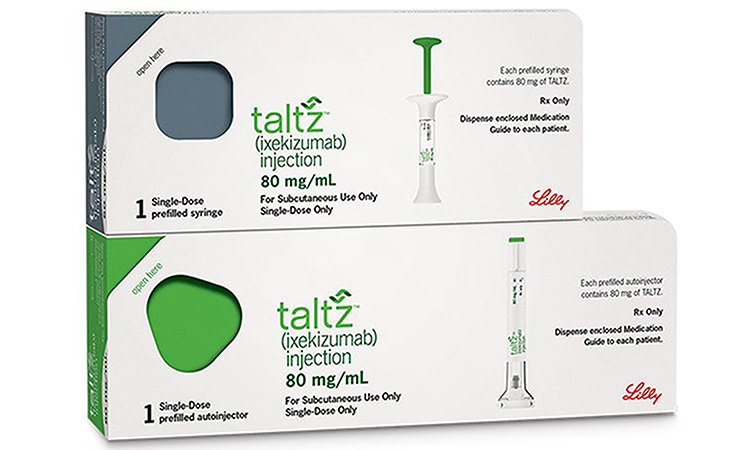Xeljanz (tofacitinib) vs Taltz (ixekizumab)
Xeljanz (tofacitinib) vs Taltz (ixekizumab)
Xeljanz (tofacitinib) is an oral Janus kinase inhibitor that is used to treat moderate to severe rheumatoid arthritis, psoriatic arthritis, and ulcerative colitis by modulating the immune system. Taltz (ixekizumab), on the other hand, is a biologic injectable medication that targets interleukin-17A, a protein that plays a role in inflammation, and is indicated for the treatment of moderate to severe plaque psoriasis, psoriatic arthritis, and ankylosing spondylitis. When deciding between the two, it is important to consider the specific condition being treated, the route of administration preference (oral for Xeljanz, injection for Taltz), and the individual's response to treatment, as well as their medical history and potential side effects.
Difference between Xeljanz and Taltz
| Metric | Xeljanz (tofacitinib) | Taltz (ixekizumab) |
|---|---|---|
| Generic name | Tofacitinib | Ixekizumab |
| Indications | Rheumatoid arthritis, Psoriatic arthritis, Ulcerative colitis | Plaque psoriasis, Psoriatic arthritis, Ankylosing spondylitis |
| Mechanism of action | JAK inhibitor, modulating the immune system | Interleukin-17A antagonist, modulating the immune system |
| Brand names | Xeljanz, Xeljanz XR | Taltz |
| Administrative route | Oral | Subcutaneous injection |
| Side effects | Upper respiratory tract infections, headache, diarrhea, and nasal congestion | Injection site reactions, upper respiratory tract infections, nausea, and fungal infections |
| Contraindications | Severe infections, active tuberculosis, severe hepatic impairment | Active tuberculosis, hypersensitivity to ixekizumab or any of the excipients |
| Drug class | Janus kinase (JAK) inhibitor | Interleukin-17A antagonist |
| Manufacturer | Pfizer | Eli Lilly and Company |
Efficacy
Xeljanz (Tofacitinib) Efficacy in Psoriatic Arthritis
Xeljanz (tofacitinib) is an oral Janus kinase (JAK) inhibitor that is approved by the U.S. Food and Drug Administration (FDA) for the treatment of adults with active psoriatic arthritis (PsA) who have had an inadequate response or intolerance to methotrexate or other disease-modifying antirheumatic drugs (DMARDs). Clinical trials have demonstrated that Xeljanz can reduce the signs and symptoms of PsA, improve physical function, and inhibit the progression of joint damage. The efficacy of Xeljanz in treating PsA was established through several randomized, double-blind, placebo-controlled trials, where patients treated with Xeljanz showed significant improvements compared to those on placebo.
One of the pivotal phase 3 trials, OPAL Broaden, evaluated the efficacy of Xeljanz in patients with PsA who had an inadequate response to at least one conventional DMARD. The study reported that a significant proportion of patients achieved the American College of Rheumatology 20 (ACR20) response, which indicates a 20% improvement in disease symptoms, after 3 months of treatment with Xeljanz. Additionally, Xeljanz was found to be effective in improving skin lesions in patients with concurrent psoriasis.
Taltz (Ixekizumab) Efficacy in Psoriatic Arthritis
Taltz (ixekizumab) is a biologic medication that is administered via injection and is approved by the FDA for the treatment of adults with active psoriatic arthritis. Ixekizumab is a monoclonal antibody that selectively targets interleukin-17A (IL-17A), a cytokine that plays a key role in the inflammation and other pathophysiological processes of PsA. Clinical studies have shown that Taltz can significantly reduce the signs and symptoms of PsA, improve physical function, and inhibit the progression of structural joint damage.
The efficacy of Taltz in PsA was demonstrated in the SPIRIT-P1 and SPIRIT-P2 phase 3 trials, where patients treated with Taltz achieved a higher ACR20 response rate compared to those receiving placebo. The trials also indicated that Taltz effectively improved skin clearance in patients with coexisting psoriasis. Furthermore, Taltz was associated with sustained efficacy and maintained improvements in joint symptoms over the long term. It is important to note that the safety and efficacy of Taltz have been established in clinical trials, but as with any medication, individual results may vary, and it is essential to discuss treatment options with a healthcare provider.
Regulatory Agency Approvals
Xeljanz
-
European Medical Agency (EMA), European Union

-
Food and Drug Administration (FDA), USA

-
Health Canada

-
Therapeutic Goods Administration (TGA), Australia

Taltz
-
European Medical Agency (EMA), European Union

-
Food and Drug Administration (FDA), USA

-
Health Canada

-
Therapeutic Goods Administration (TGA), Australia

Access Xeljanz or Taltz today
If Xeljanz or Taltz are not approved or available in your country (e.g. due to supply issues), you can access them via Everyone.org.
How it works

Make an enquiry
Choose the medicine you want to buy, answer a couple of questions, and upload your prescription to speed things up. We’ll get back to you within 24 hours.


Make an enquiry
Choose the medicine you want to buy, answer a couple of questions, and upload your prescription to speed things up. We’ll get back to you within 24 hours.


Breeze through the paperwork
We'll guide you through the required documents for importing unapproved medicine, ensuring you have all the necessary information.


Get a personalized quote
We’ll prepare a quote for you, including medicine costs and any shipping, administrative, or import fees that may apply.


Receive your medicine
Accept the quote and we’ll handle the rest - sourcing and safely delivering your medicine.

Some text on this page has been automatically generated. Speak to your physician before you start a new treatment or medication.
Let's talk
If you have any questions, call us or send us a message through WhatsApp or email:
Contact us




